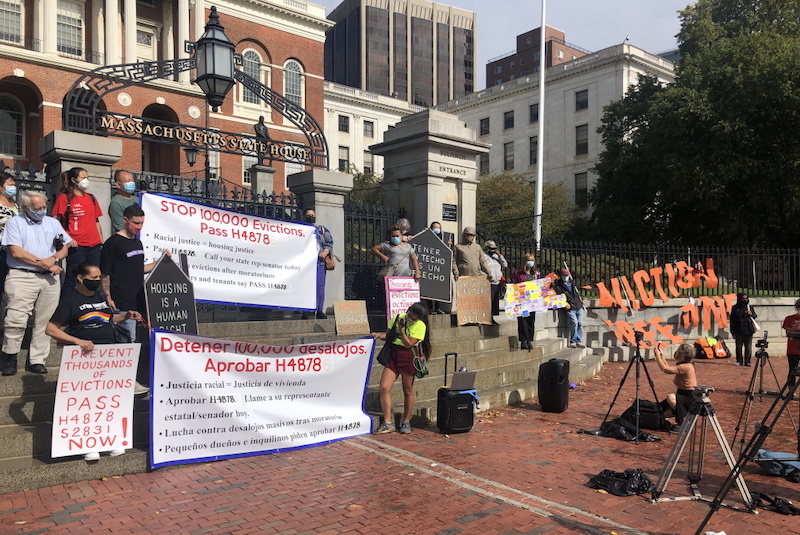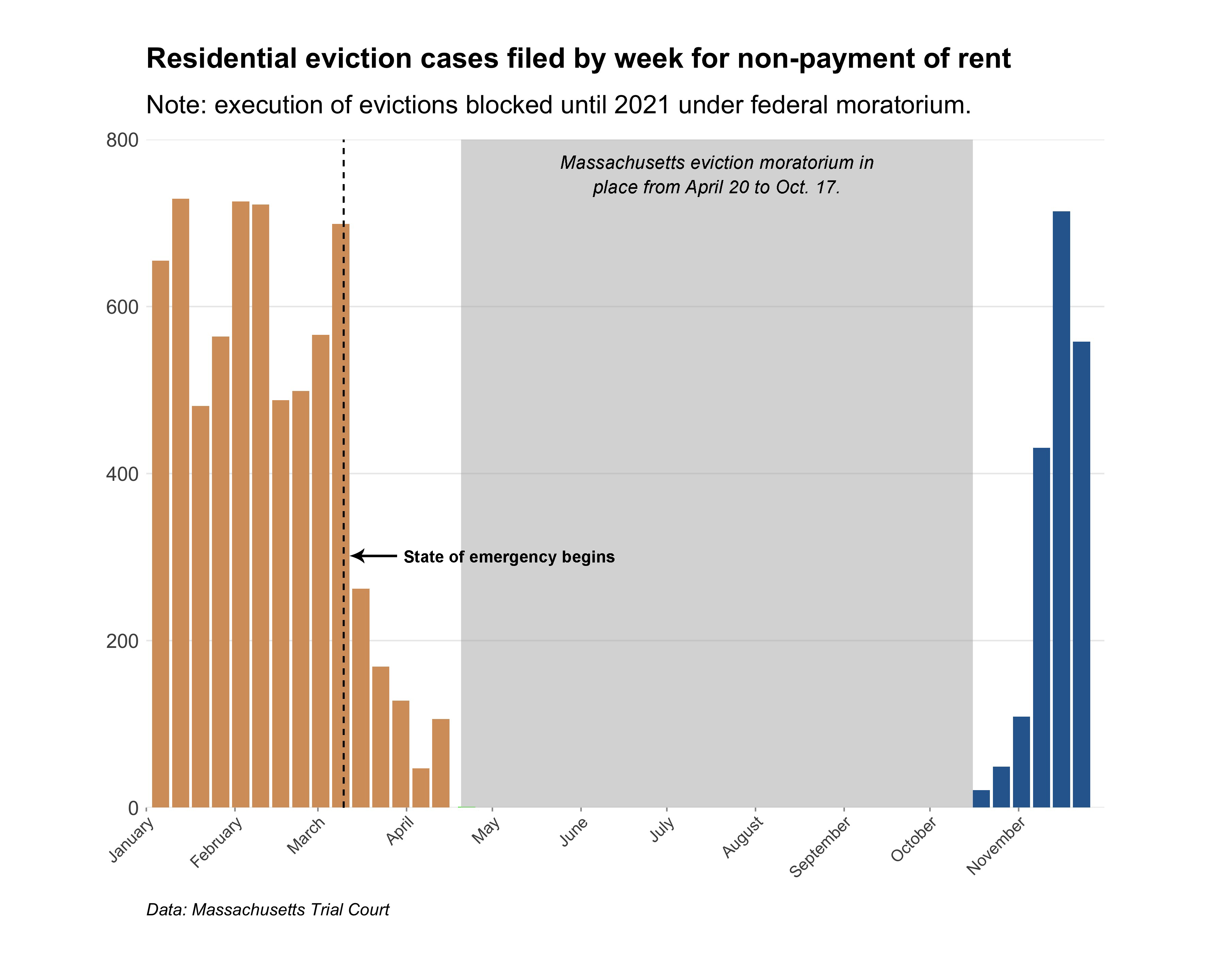Community
As new eviction cases rise in Massachusetts, activists fear safety net won’t catch evictions

By Chris Lisinski
DEC. 7, 2020…..New eviction cases for failing to pay rent are on the rise in Massachusetts in the six weeks since a state ban expired, and housing advocates want a stronger response from Beacon Hill given the rise in COVID-19 infection rates and the looming end to a federal moratorium ban.

Massachusetts Trial Court data show newly filed eviction cases for non-payment of rent have been rising since a moratorium on evictions lifted Oct. 17. [Graphic: Chris Lisinski/SHNS]
So far, attempts to remove tenants have taken the shape of a slow-building wave rather than the sudden surge that some feared. Cases were filed in recent weeks at roughly the same rate as before the pandemic, and a federal moratorium will block many evictions from being executed but is due to expire at the end of the year.
But with the pandemic’s second surge in Massachusetts accelerating, community groups and activists are concerned that the state is unnecessarily dangling over the edge of widespread housing insecurity.
“We are right at the beginning of the cliff,” said Lisa Owens, executive director of the City Life / Vida Urbana group that has urged lawmakers to take additional steps. “This is sort of our last opportunity to act.”
The state trial court system received 1,882 newly filed residential eviction for failure to pay rent cases since Oct. 17, when the moratorium that had been in place for nearly six months expired. They trickled in slowly at first, with only 70 in the first two weeks, and then rapidly picked up pace.
Over the past two weeks, cases have been filed at roughly the same clip as before the pandemic: 714 in the week of Nov. 16, and 558 in the holiday-shortened week of Nov. 23. On top of those, advocates estimate there are thousands of other eviction cases that had been filed before the state moratorium took effect that could be on the move once again.
Filing an eviction case is in many cases just an early step in the process, and not all filings will result in forceful removal of a tenant. Many cases cannot proceed to the execution stage until 2021 under a separate moratorium the U.S. Centers for Disease Control issued.
Lew Finfer, co-director of the Massachusetts Communities Action Network, said that the year-end deadline — combined with the impending expiration of expanded unemployment supports Congress created — could prove to be a dangerous turning point.
“It’s a bleak situation getting further and further bleaker and moving into a crisis situation as this all mounts up,” Finfer said.
In April, during the first peak of the COVID-19 outbreak, Gov. Charlie Baker signed a bill placing a moratorium on almost all non-emergency evictions and foreclosures. The legislation did not exempt tenants from eventually making good on financial obligations, but aimed to keep as many people as possible safely housed during the public health crisis and at a time when jobs losses were high due to forced business closures.
Baker extended the temporary ban once, but he allowed it to expire on Oct. 17 and instead unveiled a $171 million plan
The proposal increased the maximum Residential Assistance for Families in Transition (RAFT) benefit available from $4,000 to $10,000 per household, with $100 million available for the program this fiscal year.
More than 5,800 unique households have received RAFT benefits since April, according to an administration spokesperson. Between June 1 and Nov. 30, the state paid out $15.6 million in both RAFT aid and administrative fees to the regional agencies that distribute the funding.
Baker’s alternative to extending the moratorium drew praise from many real estate leaders and landlords, who have argued that they do not want to cause housing insecurity but sometimes need to use court filings to resolve issues with tenants.
Greg Vasil, president and CEO of the Greater Boston Real Estate Board, said allowing the temporary ban to end will help state and industry leaders get a clearer sense of the outlook on the ground.
“When I look at this problem, filing the cases isn’t the problem. What we need to do is make sure people don’t end up on the sidewalk,” Vasil said. “I don’t think anybody wants to be able to do that. I think what they want to do is look at these cases like an onion. We peel back the first layer and we’ve solved some of those. Let’s work on the second layer and the third layer and see, at the end of the day, when we’re finally down to the core of the onion, how many cases are actually left with people with total hardship, and then see what resources we might be able to have to help them out.”
Other organizations and leaders aligned with tenants do not share Vasil’s optimism about the administration’s response.
The RAFT system had a backlog before the new plan, and limits on the expanded funding — such as requiring that tenancy can last for six months or until June 2021 for households with school-aged children — make it “a lot harder” to access, according to Andrea Park, an attorney with the Massachusetts Law Reform Institute.
A free mediation program the administration helped launch with the Office of Public Collaboration has been available for landlords and tenants since Nov. 16, according to an administration spokesperson.
Several other components of the plan have yet to make tangible impacts, Park said. The administration said it would hire lawyers to help more tenants have legal representation during eviction proceedings, but that project is still getting off the ground.
“Not only are those resources not ready now, there was no way they were going to be ready,” Park said. “They were announced five days before (the moratorium) ended. There were people who, on Monday morning after the moratorium ended on Saturday night, got eviction notices, like ‘you’re going to be out in three days.'”
According to Trial Court data, nearly 98 percent of defendants in rent-related eviction cases in 2020 did not have a lawyer, compared to just 35 percent of plaintiffs.
Park, Owens and Finfer said they believe lawmakers should take a more forceful approach, backing legislation co-authored by Housing Committee Co-chair Rep. Kevin Honan that would keep a moratorium in place for a year after the state of emergency’s end and offer funds to small landlords financially impacted by the crisis.
That bill (H 5018) has failed to gain traction. In October, Honan said it needed more time and work after it cleared his committee. It remains before the House Rules Committee chaired by Canton Democrat Rep. William Galvin.
Some additional protections may emerge through the state budgeting process.
The compromise budget on Gov. Baker’s desk makes substantial investments in housing subsidies and homeless shelters, and calls on the administration to report on how its eviction diversion program is faring. Those diversion programs are supplemented by pledges from housing owners or operators in charge of more than 57,000 units in Massachusetts to attempt to avoid evictions and instead reach payment plan agreements with tenants.
For Park, though, those steps are only a bandage.
“It’s not enough, what’s happening in the budget, but I think it will be something,” she said. “The budget components primarily will slow down the eviction process and wait for the RAFT application process to play out, but we’re still in a very dangerous moment.”






You must be logged in to post a comment Login